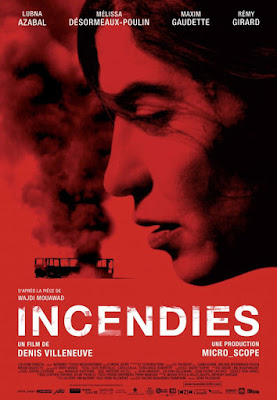Incendies (2010)
Director: Denis Villeneuve
Stars: Lubna Azabal, Mélissa Désormeaux-Poulin, Maxim GaudetteRuntime: 131 minutes
Synopsis: Twins journey to the Middle East to discover their family history and fulfill their mother's last wishes.
Performances: 8/10
Screenplay: 7/10
Editing: 8/10
Cinematography: 8/10
Score/Soundtrack: 8/10
Screenplay: 7/10
Editing: 8/10
Cinematography: 8/10
Score/Soundtrack: 8/10
Verdict: "Incendies" is Denis Villeneuve's last foreign language film before he became a Hollywood regular. Released in 2010, it went on to grab a much deserved nomination at the Oscars in the Best Foreign Language category in which it competed against juggernauts such as Yorgos Lanthimos' "Dogtooth" and Alejandro G. Iñárritu's "Biutiful" but ultimately lost to Denmark's entry: "In a Better World".
Adapted from a play by the same name, the film alternates between two timelines. In the first, we follow a young Nawal Marwan as she struggles to exist in a fictional Middle Eastern country (although heavily influenced by Lebanon) torn by war and a suffocating patriarchy. The second sees her daughter Jeanne in present times, where after being given a letter to deliver to her father right after her mother's death, goes on a quest to that same Middle Eastern country to find him and uncover the truth about Nawal's past.
"Incendies" is a movie very much driven by its narrative and themes. From religious conflicts to terrorism and a reigning patriarchal system, Villeneuve brings up topics that are still the source of many injustices in all of the Middle East and develops them in quite an effective way. The mystery aspect of the story, led by very layered female characters, is also quite a fascinating one to see unfold. In it, Jeanne, who lived her entire life in Canada, discovers a culture vastly different from her own, and jumps from clue to clue to find out who her father truly is. The only real issue I have with "Incendies" is its ending, which was a little too exaggerated and reliant on more than one huge coincidences that were both unnecessary and difficult to by for me.
Regardless, I'd still obviously recommend this movie purely for its commentary on many sensitive topics. It's Denis Villeneuve's first movie to get worldwide acclaim (although some argue that "Polytechnique" holds that recognition) and the start of a long and successful career for him.
Adapted from a play by the same name, the film alternates between two timelines. In the first, we follow a young Nawal Marwan as she struggles to exist in a fictional Middle Eastern country (although heavily influenced by Lebanon) torn by war and a suffocating patriarchy. The second sees her daughter Jeanne in present times, where after being given a letter to deliver to her father right after her mother's death, goes on a quest to that same Middle Eastern country to find him and uncover the truth about Nawal's past.
"Incendies" is a movie very much driven by its narrative and themes. From religious conflicts to terrorism and a reigning patriarchal system, Villeneuve brings up topics that are still the source of many injustices in all of the Middle East and develops them in quite an effective way. The mystery aspect of the story, led by very layered female characters, is also quite a fascinating one to see unfold. In it, Jeanne, who lived her entire life in Canada, discovers a culture vastly different from her own, and jumps from clue to clue to find out who her father truly is. The only real issue I have with "Incendies" is its ending, which was a little too exaggerated and reliant on more than one huge coincidences that were both unnecessary and difficult to by for me.
Regardless, I'd still obviously recommend this movie purely for its commentary on many sensitive topics. It's Denis Villeneuve's first movie to get worldwide acclaim (although some argue that "Polytechnique" holds that recognition) and the start of a long and successful career for him.
FINAL GRADE: 8/10

Comments
Post a Comment